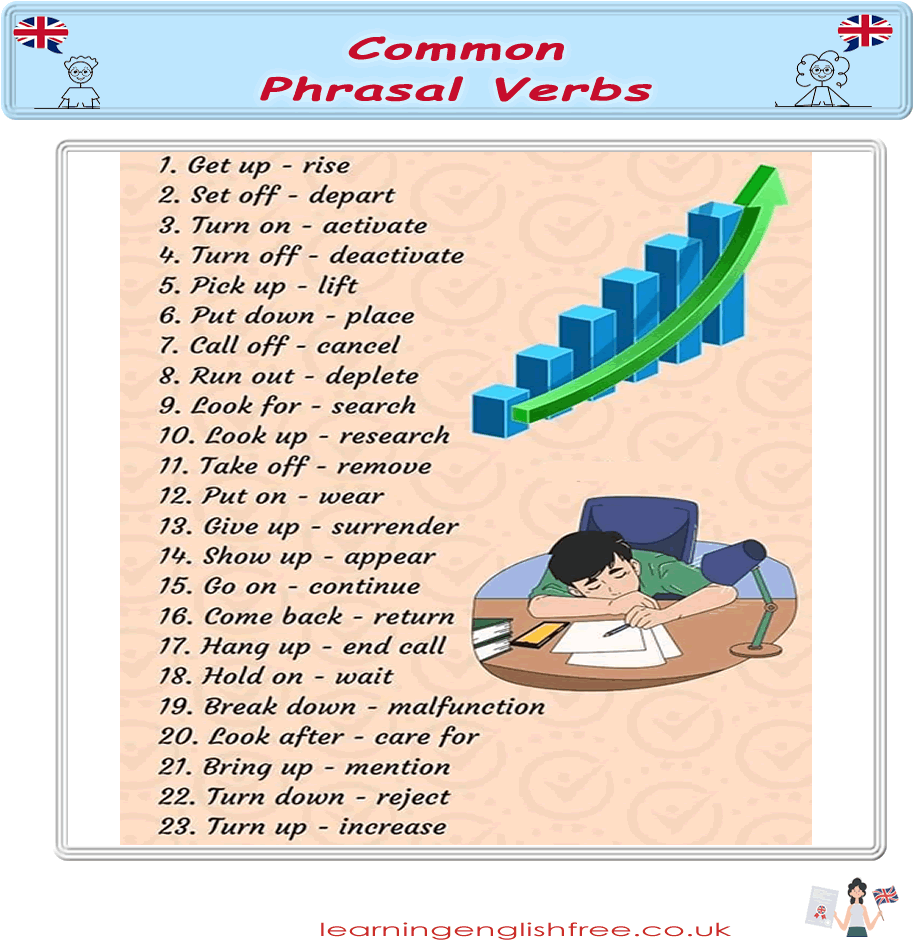
The Power of Phrasal Verbs in English
Phrasal verbs are a vital English language component, adding nuance and depth to everyday conversations. These combinations of verbs and prepositions or adverbs can often seem daunting to ESL learners due to their idiomatic nature. However, mastering them is essential for achieving fluency and understanding native speakers. This lesson breaks down common phrasal verbs into simple explanations and examples, making them accessible to beginners.
Learning Objectives
- Understand the meanings of common phrasal verbs.
- Learn how to use these phrasal verbs in sentences.
- Enhance conversational skills by incorporating phrasal verbs into your English.
Common Phrasal Verbs: Meanings and Examples
-
Get up - rise from bed.
"I get up at 7 a.m. every day." -
Set off - depart on a journey.
"We set off for our trip early in the morning." -
Turn on - activate an electronic device.
"Could you turn on the light, please?" -
Turn off - deactivate an electronic device.
"Don't forget to turn off the TV before you leave." -
Pick up - lift something.
"She picked up the book from the floor." -
Put down - place something
"Please put down the glass on the table." -
Call off - cancel an event
"The meeting was called off due to bad weather." -
Run out - deplete of something
"We've run out of milk." -
Look for - search for something.
"I'm looking for my keys." -
Look up - research information.
"I need to look up some facts for my essay." -
Take off - remove clothing.
"Take off your shoes before entering the house." -
Put on - wear clothing.
"He put on his jacket because it was cold." -
Give up - surrender.
"Never give up on your dreams." -
Show up - appear at an event.
"He didn't show up to the party." -
Go on - continue.
"The show must go on, despite the difficulties." -
Come back - return to a place
"When will you come back from your vacation?" -
Hang up - end a phone call
"She hung up the phone abruptly." -
Hold on - wait
"Hold on a minute, I'll check the schedule." -
Break down - malfunction.
"My car broke down on the way to work." -
Look after - care for someone or something.
"Can you look after my dog this weekend?" -
Bring up - mention a topic.
"He brought up an interesting point during the discussion." -
Turn down - reject an offer or request.
"She turned down the job offer." -
Turn up - increase the volume or intensity.
"Can you turn up the music?"
Conclusion and Summary
Today's lesson on common phrasal verbs has unveiled the richness they add to the English language, making conversations more dynamic and expressive. By understanding and using these verbs, you'll enhance your vocabulary and improve your ability to communicate more naturally and effectively.
Key Takeaways
- Phrasal verbs are essential for fluent English communication, offering a way to express complex ideas through simple verb combinations.
- Practice and repetition are key to mastering the use of phrasal verbs in various contexts.
- Incorporating phrasal verbs into your daily conversations will help you sound more like a native speaker.
Remembering Tips
- Create flashcards with phrasal verbs and their meanings to study in your spare time.
- Use sticky notes placed around your home with different phrasal verbs to regularly remind yourself to practice them.
- Engage in conversation practice, either with language exchange partners or through online platforms, to apply what you've learned.
Join us on our journey to mastering English by sharing your progress and exploring more lessons at Learning English Free. Let's learn, share, and grow together!
